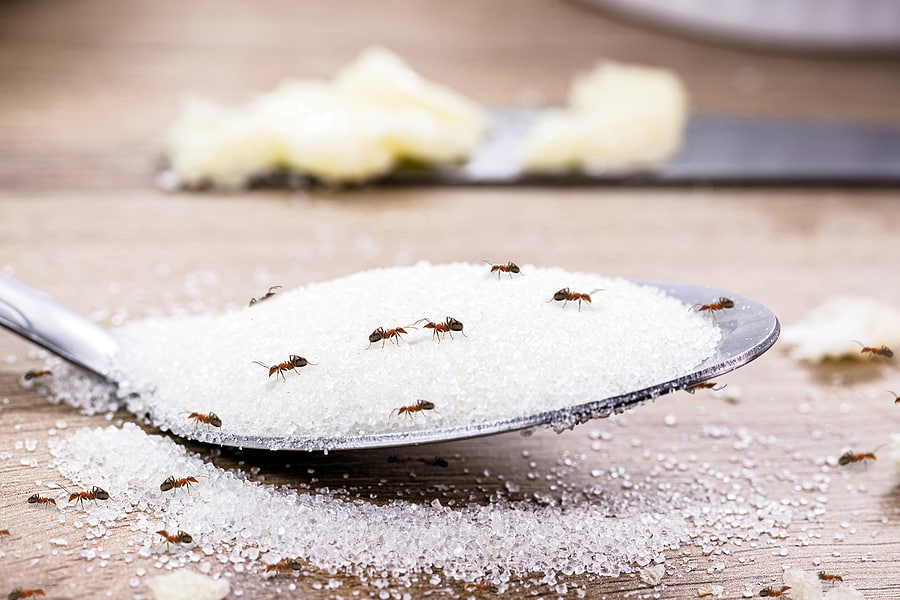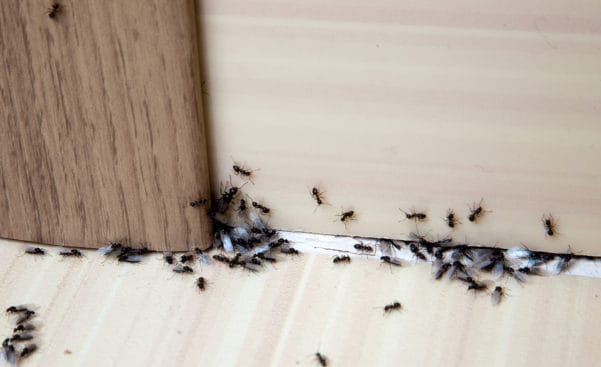READY TO GET STARTED?
REQUEST A FREE ESTIMATE
Fill out the form below or call (888) 466-7849 for a free, no-obligation estimate.

The kitchen is one of the most common rooms in your home to have ants, closely followed by the bathroom. The most common ants found indoors are odorous house ants, also known as nuisance ants. While these ants don’t cause structural damage and aren’t considered dangerous to humans or pets, they can contaminate your food and become quite a nuisance to deal with. Carpenter ants are larger black ants that can also get into your home. These ants do cause structural damage by boring through the wood components of your house.
The ants you find in your home don’t actually live there; they build colonies outdoors and come in looking for food and water to take back. These elements are necessary for the colony to live and grow. Scout ants who find these sources leave a pheromone trail for the rest of the colony to follow which is why you will often see ants traveling in a single line. Because they can scale walls and travel between stories in your home, they can spread quickly and be extremely difficult to get rid of.
Ants are attracted by a number of things found in your home. They use crumbs, spills, loosely sealed food packages, dirty dishes, and even pet food bowls to find food. They use leaky pipes, pet water bowls, and standing water for hydration.
What can you do to keep ants from taking over your kitchen? Prevent ants by:
Killing just the ants you find in your home won’t eliminate the entire infestation. You must eradicate them at the source – at their colonies. These ants can be difficult to eliminate because individual colonies can number in the thousands and they can be spread out all over your property. For assistance in dealing with ants or any other pests you may find in your home, contact your local pest control company for an evaluation.
9 Easy Ways to Keep Birds Away

Ants are the most commonly reported pest in the country. While ants can be found just about anywhere in your home, the kitchen and bathroom are the most common rooms they are spotted in. Tiny black ants, also known as “nuisance ants,” or “odorous house ants,” invade your kitchen in search of food and water. While these nuisance pests are quite common, you may not know much about them. Here are 6 things you should know about these ants in your kitchen.
Ants don’t typically live indoors but instead establish colonies around your property. They will then make their way indoors in search of food and water. While odorous house ants can be quite a nuisance when they invade your kitchen, they don’t pose any significant risk to humans or their homes. These ants will feed on food and drink, especially sugary, sweet items and are attracted to crumbs and spills usually found in your kitchen. They don’t, however, bore through wood or cause structural damage to your home.
Ants in the kitchen are usually coming from somewhere and traveling to somewhere. If you follow their trail in both directions you can usually identify the food source that is attracting them. Cleaning up the spill or eliminating the food source will typically eliminate the ant problem. Ants can squeeze through openings the size of a pinhole, however, so while sealing up any entry points you find is a good idea, don’t be surprised if they make their way in again in the future.
Like most pests, ants are seasonal and incidences typically ebb and flow. Ants most commonly spike in the spring and summer when the weather warms up. This increase in temperature also increases their activity, driving them indoors in droves. They are also much more common following unseasonably warm winters. This is also swarming ant season which also increases their activity.
Ants are very social and have developed communication methods between each other. Ants can communicate through touch and through shared food. This communication helps them to avoid repellent remedies. Repellents like chalk that are placed in a line are often avoided by ants who just go around them. Spraying them with repellents will kill a few on contact but will typically just repel the rest, causing them to scatter but not die. A professional can treat ants with non-repellent products that they will take back to their colonies and disseminate among the entire population.
Different species of ants are attracted to different things and are treated in different ways. Proper identification is key to complete elimination. If you have an ant problem, try not to kill them all yourself because then your pest control company cannot identify them accurately. Best practice is to either leave them alone or try to collect samples by using tape to pick up a few and placing them in a Ziploc bag.
Ant control is difficult as they can get into your home through the tiniest of openings. Most ants are just a nuisance and can be gotten rid of by sealing your food and keeping spills and crumbs cleaned up. This does not, however, get rid of the colonies lurking outside your home waiting to get back in in search of food. If you suspect you have an ant problem or are having difficulty getting rid of an existing ant problem, contact a professional pest control company who can help properly identify the species of ant and provide the appropriate ant control techniques.
Can Termites Be Prevented or Is It Just Luck?
7 Tips For A Healthy Winter Lawn
Stop the Overwintering Pest Invasions